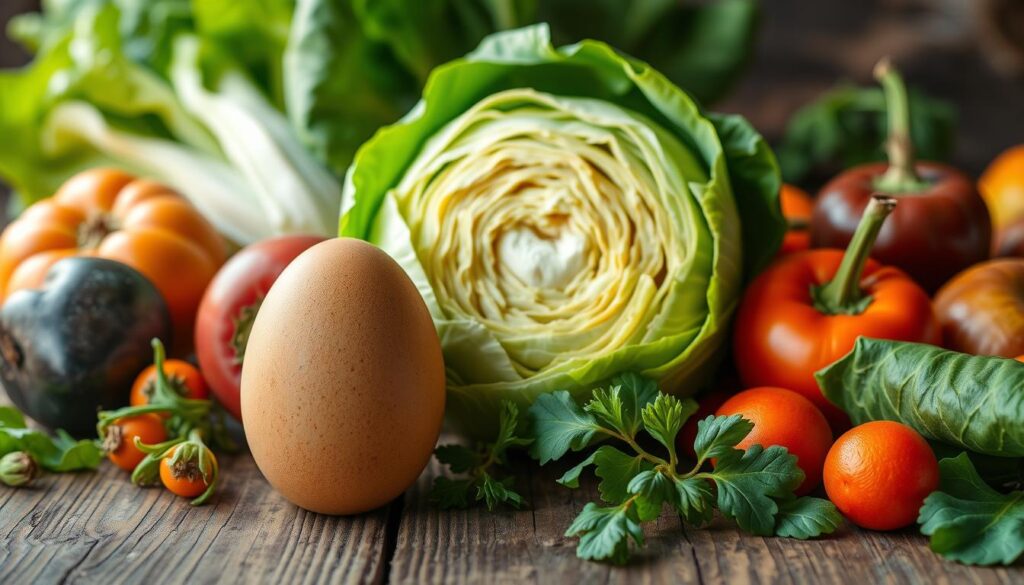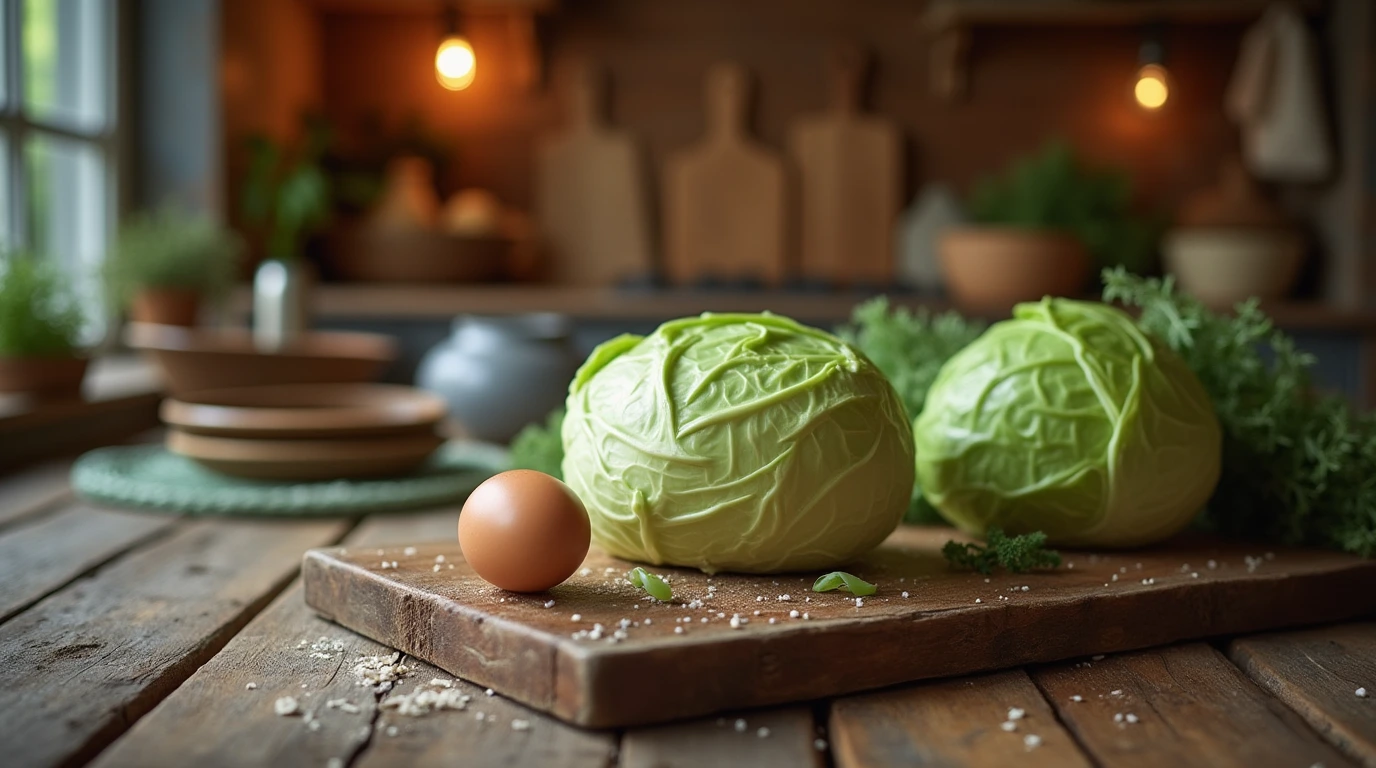Looking into can we eat egg and cabbage shows us a mix that’s both healthy and flexible. Eggs and cabbage are common in many diets. They bring a lot of health benefits and can go well together on your plate.
This article looks at their nutritional values and the benefits of eating them together. We’ll explore nutrition facts, cooking ways, and their cultural importance. Our goal is to show how these foods can help make your diet balanced. They’re great additions to your meals.
Introduction to Egg and Cabbage
Eggs and cabbage are common on dinner plates, known for their health benefits. Eggs are a complete protein, giving the body the amino acids it needs. One large egg has about 6 grams of protein, making it a key food in many diets.
Cabbage is rich in vitamins like vitamin C and vitamin K. These vitamins help boost the immune system and keep bones strong.
There are many ways to cook eggs and cabbage, leading to a variety of dishes. Eggs can be boiled, scrambled, or poached. Cabbage can be sautéed, steamed, or added raw to salads. This makes egg and cabbage a great choice for any meal, adding flavor and nutrition.
For example, cabbage egg curry is a dish that combines these ingredients. It’s both tasty and healthy, with about 150 calories per serving.

Each serving of cabbage egg curry has 7 grams of protein and 10 grams of carbs. This shows how well eggs and cabbage work together. They support health and open up new cooking ideas. By trying different ways to cook them, meals can be both fun and healthy.
Nutritional Overview of Eggs
Eggs are known for their eggs nutritional value. They are packed with high-quality protein and many vitamins. These include vitamin D and vitamin B12, which are vital for our bodies.
Eggs also have choline, which is good for our brains. The protein in eggs helps repair and grow muscles. This makes eggs a great choice for athletes and health lovers.
With vitamins and fatty acids, eggs boost our well-being. They have omega-6 fatty acids, which are beneficial.
The table below shows the nutrients in eggs:
| Nutrient | Amount per 100g |
|---|---|
| Calories | 143 |
| Protein | 12.6g |
| Fat | 9.5g |
| Saturated Fat | 3.1g |
| Cholesterol | 372mg |
| Vitamin D | 1.75µg |
| Vitamin B12 | 0.89µg |
| Calcium | 56mg |
| Iron | 1.8mg |
| Choline | 251mg |
Eggs are a great addition to a healthy diet. They support muscle health, bone strength, and overall energy.
Nutritional Overview of Cabbage
Cabbage is a low-calorie veggie packed with nutrients. One cup (89g) of chopped cabbage has just 22 calories. It also has 5g of carbs and 2g of fiber. This makes it great for a healthy diet.
It’s rich in cabbage vitamins, giving you 54% of Vitamin C and 85% of Vitamin K you need daily. Cabbage is also full of antioxidants like flavonoids and polyphenols. These help fight chronic diseases.
Eating cabbage can make you feel full thanks to its fiber. It has about 1 gram of fiber for every 10 calories. It’s also a good source of folate, potassium, magnesium, and vitamins A and K.
Fresh cabbage can last 2-3 weeks in the fridge. It’s affordable at about 62 cents per pound. Adding cabbage to meals with eggs makes a protein-rich dish that’s low in carbs. This helps keep your energy up and aids digestion.
| Nutrient | Amount per Cup of Cabbage (89g) | Health Benefits |
|---|---|---|
| Calories | 22 | Low-calorie option |
| Vitamin C | 54% RDI | Boosts immune function |
| Vitamin K | 85% RDI | Supports bone health |
| Fiber | 2g | Aids digestion and promotes satiety |
| Other Nutrients | Folate, potassium, magnesium | Contributes to overall health |
Can We Eat Egg and Cabbage? The Nutritional Compatibility
Eggs and cabbage together make a meal that’s both tasty and healthy. Eggs are packed with protein, fats, and vitamins. Cabbage, on the other hand, is full of fiber and vitamins C and K, plus antioxidants. This mix creates a meal that’s not only filling but also good for you.
Complementary Nutritional Profiles
Let’s look at what eggs and cabbage offer. Here’s a table showing their key nutrients:
| Nutrient | Egg (per large egg) | Cabbage (per 1 cup, chopped) |
|---|---|---|
| Calories | 72 | 22 |
| Protein | 6 g | 1 g |
| Fat | 5 g | 0 g |
| Fiber | 0 g | 2 g |
| Vitamin C | 0.0 mg | 32 mg |
| Vitamin K | 0.3 mcg | 63.6 mcg |
Combined Health Benefits
Eating eggs and cabbage together has many health perks. Cabbage’s fiber helps with digestion, while eggs’ protein keeps you full. This combo also helps your body absorb nutrients better.
This teamwork boosts your health and supports a balanced diet. It can improve brain function and help with weight control.
Synergistic Nutritional Impact of Egg and Cabbage
Eggs and cabbage together offer big synergistic benefits for health. Eggs are full of protein, which helps muscles and keeps energy up. Cabbage’s high fiber helps with digestion.
This mix boosts antioxidants, fighting off chronic diseases. Eggs have vitamin B12, key for nerves and blood. Cabbage has quercetin and fiber, fighting inflammation and improving gut health.
Using eggs and cabbage together boosts nutrient absorption. This is key for using vitamins and minerals well. For example, cabbage’s fiber helps digest egg protein, making nutrition more complete.
| Nutrient | Eggs | Cabbage | Combined Benefits |
|---|---|---|---|
| Protein | High | Moderate | Muscle Repair & Energy |
| Fiber | Low | High | Digestive Health |
| Vitamins (like B12) | High | Moderate | Nerve Function Support |
| Antioxidants | Low | High | Chronic Disease Protection |
Health Benefits of Eating Egg and Cabbage Together
Eating egg and cabbage together is not just tasty. It also boosts your health in many ways. They help with digestion and managing weight. Together, they make a great team for better health.
Support for Digestive Health
Cabbage is full of dietary fiber, which is good for your gut. It helps keep your bowel movements regular and your gut healthy. The vitamins and minerals in both egg and cabbage also support a healthy digestive system.
Eating these foods can ease digestive problems. It can also make your gut healthier.
Role in Weight Management
Egg and cabbage are good for keeping your weight in check. They are low in calories but high in protein and fiber. This makes you feel full longer, helping you eat less.
A recipe like Simply Cabbage and Eggs has 268 kcal. It has 12.2g of protein and 1.8g of fiber. Adding these to your diet can help with weight loss.
Popular Egg and Cabbage Recipes
Looking to mix flavors and health benefits? Cabbage and egg recipes are a great choice. They show how versatile these ingredients are and offer quick, healthy meal options. Here are two recipes that are easy to make and delicious.

Simple Scrambled Egg with Cabbage
This recipe is quick and uses simple ingredients. Slice 1/4 cabbage finely and whisk 2 eggs with soy sauce. It’s ready in 15 minutes, perfect for a quick dinner or breakfast.
| Ingredients | Amount |
|---|---|
| Cabbage | 1/4 (finely sliced) |
| Eggs | 2 |
| Soy Sauce | 1 tablespoon |
This dish gets a 4.7 out of 10 rating from users. You can serve it with rice or noodles for more filling. Make it ahead and keep it in the fridge for two weeks or freeze for longer.
Cabbage and Egg Stir-Fry
For a sizzling dish, try the cabbage and egg stir-fry. It uses the same ingredients but cooks differently, offering a mix of tastes and textures. Prep time is 5 minutes, cook time is 10 minutes.
| Nutritional Values per Serving | Amount |
|---|---|
| Calories | 151 kcal |
| Carbohydrates | 2 g |
| Protein | 12 g |
| Fat | 10 g |
| Cholesterol | 327 mg |
| Sodium | 294 mg |
Try using frozen broccoli instead of cabbage or add bacon for a meatier taste. You can also top it with parmesan or chili oil for extra flavor. This stir-fry is a great example of how tasty cabbage and egg recipes can be.
Risks and Considerations
Both eggs and cabbage can pose risks, mainly for those with food allergies or sensitivities. It’s important to know these risks to make smart food choices.
Potential Allergies and Food Sensitivities
Egg allergies are common, hitting many children hard. Symptoms range from mild rashes to life-threatening anaphylactic reactions. While some kids grow out of it, it’s a big worry for many.
Jacobson’s Food Allergy Study shows egg allergies affect about 1.3% of kids under five.
Cabbage can upset some people’s stomachs. It might cause bloating or gas. This is because of its complex carbs and fiber. Those with irritable bowel syndrome often find cabbage makes their symptoms worse.
It’s key to watch how your body reacts to eggs and cabbage. Keeping a food diary can help spot patterns and find out what you’re sensitive to. If you know you’re sensitive, look for other foods or talk to a doctor for advice.
| Allergen | Common Symptoms | Advice |
|---|---|---|
| Egg Allergy | Rash, hives, gastrointestinal distress, anaphylaxis | Avoid eggs, consult an allergist |
| Cabbage Sensitivity | Bloating, gas, abdominal pain | Limit intake, consider low-FODMAP options |
Cultural Perspectives on Cabbage and Egg Dishes
Egg and cabbage dishes are important in many cultures around the world. They show how these ingredients can be used in many ways. These dishes often come from old traditions, bringing comfort and showing off local tastes.
Regional Variations in Recipes
Every culture has its own way of mixing eggs and cabbage. In Ireland, they make a dish with bacon and green cabbage. It’s served with mustard and boiled potatoes, making a big meal for eight people.
This recipe uses just five main ingredients, including a big onion and chicken broth. The bacon and cabbage add nutrients, making it a hearty dish.
| Ingredient | Amount |
|---|---|
| Bacon (thick-cut) | 24 ounces |
| Green cabbage | 1 large |
| Onion | 1 large |
| Chicken broth | 2 1/2 cups |
| Mustard seeds | 1 tablespoon |
Traditional Uses in Different Cuisines
In Greek cuisine, there’s a dish called Egg-Lemon Stuffed Cabbage. It uses ground turkey or chicken with an egg-lemon sauce. It’s easy to make, needing just four steps.
In East Asia, cabbage is used in stir-fries with eggs. These dishes are full of flavor and balance. They show how egg and cabbage dishes are similar yet different in each culture.
Conclusion
Eating egg and cabbage can make your meals more enjoyable and healthy. These foods are packed with nutrients that boost your overall health. They help with digestion and managing weight, making them great for a balanced diet.
There are many ways to use egg and cabbage, like scrambled eggs with cabbage or a tasty stir-fry. Trying new recipes lets you find exciting flavors and textures. It also makes your meals more nutritious.
Using egg and cabbage in your cooking is a fun way to improve your health. Knowing how they work together and their health benefits helps you make better food choices. Start adding these ingredients to your meals for a healthier and more enjoyable eating experience.
FAQ
Can eggs and cabbage be eaten together safely?
Yes, eggs and cabbage are safe to eat together. They are a great pair because eggs offer high-quality protein. Cabbage, on the other hand, is packed with fiber, vitamins, and antioxidants.
What are the health benefits of consuming eggs and cabbage?
Eating eggs and cabbage together is good for your health. Cabbage helps with digestion thanks to its fiber. Antioxidants in cabbage also support heart health. Together, they make a meal that helps repair muscles and boosts energy.
Are there any recipes that combine eggs and cabbage?
Yes, there are many tasty recipes that mix eggs and cabbage. Try scrambled eggs with sautéed cabbage or a cabbage and egg stir-fry. These dishes are not only delicious but also nutritious and quick to make.
What nutritional aspects do eggs offer?
Eggs are a fantastic source of complete protein and essential fatty acids. They also have vitamins B12 and D, and choline, which is good for your brain.
What nutritional benefits does cabbage provide?
Cabbage is low in calories but rich in vitamins C and K. It also has plenty of fiber and antioxidants. These nutrients help with digestion and fight chronic diseases.
Can eating eggs and cabbage support weight management?
Yes, eggs and cabbage can help with weight management. They are low in calories but high in protein and fiber. This combination can help you feel full longer and may reduce your calorie intake.
Are there any allergies associated with eggs or cabbage?
Some people, like children, may be allergic to eggs. Others might feel uncomfortable after eating cabbage. Always watch for any reactions and talk to a doctor if you have concerns.
How do different cultures use eggs and cabbage in their cuisines?
Eggs and cabbage are used in many cuisines around the world. In Eastern Europe, they make cabbage and egg pies. In Asia, they stir-fry them together. This shows how versatile and loved these ingredients are globally.

